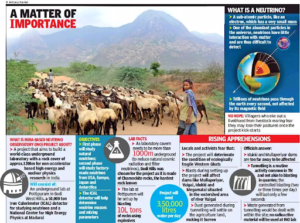In news–Recently, the Tamil Nadu government has filed an affidavit in the Supreme Court stating that it would not permit the construction for the proposed Indian Neutrino Observatory at Bodi West Hills in Theni district.
Reasons for not permitting it-
- The proposed project area links the Periyar Tiger Reserve in Kerala with Srivilliputhur Meghamalai Tiger Reserve which ecologically links to the eastern habitats.
- As per the state government, the project, if implemented, will affect the flora and fauna of the Periyar Tiger Reserve(Mathikettan-Periyar tiger corridor) and Mathikettan Shola National Park in the Western Ghats and would jeopardize the ecological sustainability of the zone, deep in the Western Ghats.
- Quarrying and construction activities will upset wild animals which use the corridor for seasonal migrations.
- The area is a significant watershed and catchment zone for the rivers Sambhal and Kottakudi.
- Hence the state has claimed that the project violates provisions of the Wildlife (Protection) Act 1972 and Forest (Conservation) Act of 1980.
About Indian Neutrino Observatory project
- It is a particle physics research project under construction to primarily study atmospheric neutrinos in a 1,200 meters (3,900 ft) deep cave under INO Peak near Pottipuram village in Theni district in Tamil Nadu.
- Its primary goal is to study the properties and interactions of weakly interacting, naturally occurring particles, called neutrinos.
- The project was conceived in 2005, a site under the Bodi West Hills in Tamil Nadu’s Theni district was identified by 2009 and a Rs 1,500 crore fund was proposed by 2015.
- But the project, dogged by delays and a legal battle, has been a non-starter.
- The INO proposal consists of creating two underground laboratory caverns with a rock cover of more than 1000 meters all around to house detectors and control equipment and an access tunnel of length 2 km to reach the underground laboratory.

- The project proposal comprises 26.825 hectares of revenue land above ground and 4.62 hectares of land underground, comprising the tunnels and lab caverns.
- The project is anticipated to provide a precise measurement of neutrino mixing parameters.
- It is one of the biggest experimental particle physics projects undertaken in India and some of the partners of the project are Tata Institute of Fundamental Research (TIFR), Mumbai, Bhabha Atomic Research Centre (BARC), Mumbai, Institute of Mathematical Sciences (IMSc), Chennai.
- The underground laboratory planned a 50-kiloton magnetized iron calorimeter detector to detect atmospheric neutrinos.
- When completed, the main magnetized iron calorimeter (ICAL) experiment will include the world’s largest magnet, four times larger than the 12,500-tonne magnet in the Compact Muon Solenoid detector at CERN in Geneva, Switzerland.














